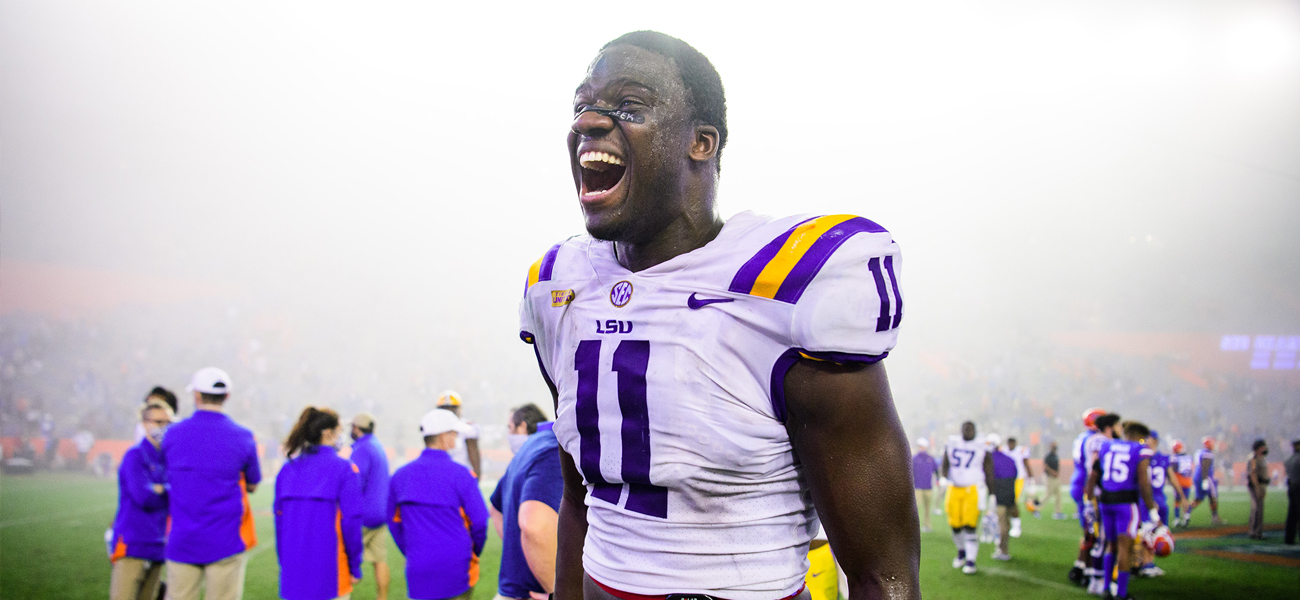
After moving all over, Ali Gaye has found his home in Baton Rouge
Have you ever looked at The Gambia on a map?
Honestly, I don’t know that I could have pointed to it with any specificity beyond the general West Africa region until a couple years ago.
It’s nestled completely inside Senegal, surrounded by its neighbors on all sides except the Atlantic Ocean coastline. It’s an oddly shaped country that follows the natural curvy flow of the Gambia River, resulting in what looks like a finger or a worm.
|
|
It’s smaller than Connecticut, has fewer people than Kansas, traditionally serves millet and rice porridge for breakfast, and elects its leaders with marbles.
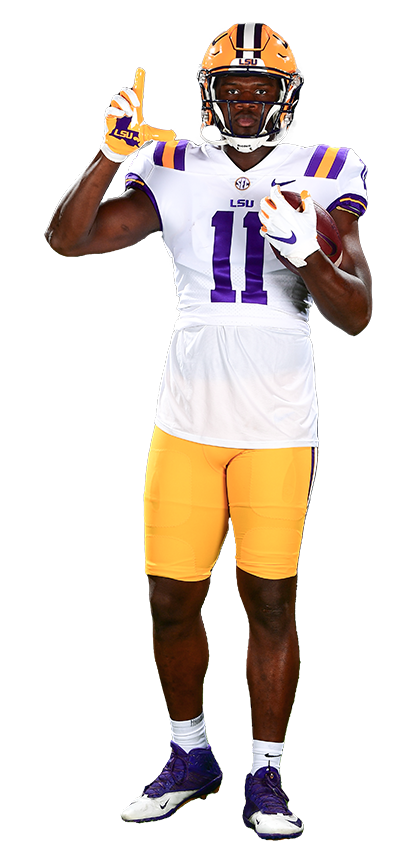
All that’s to say it’s a long way both geographically and culturally from south Louisiana.
So you can probably only imagine the obstacles Ali Gaye has had to face to go from a young Gambian soccer player to an All-SEC defensive lineman in less than a decade.
FROM AFRICA TO AMERICA
It feels fitting that The Gambia is known as “The Smiling Coast.”
The country adopted the nickname sometime in the 1970s during a boom in tourism, and its people are known to be some of the friendliest in the world.
If Gaye is any measuring stick, the moniker is accurate. He’s got a warm smile that he’s not afraid to share and a gentle personality that makes his 6-foot-6, 270-pound frame a little less intimidating.
But Gaye didn’t always have this sizeable stature. He was “a lot shorter and a lot smaller” growing up, making him an agile, athletic soccer player.
He occasionally played in the midfield but mostly featured as a defender, where he would—unknowingly—begin to lay his foundation for American football.
“Soccer really helped me a lot with my footwork and how I’m able to move the way I move, even though I’m twice the size I was a few years ago,” Gaye tells 225. “I still love soccer to this day. It’s not as big here in the States, but I try to keep the love in me and play whenever I can.”
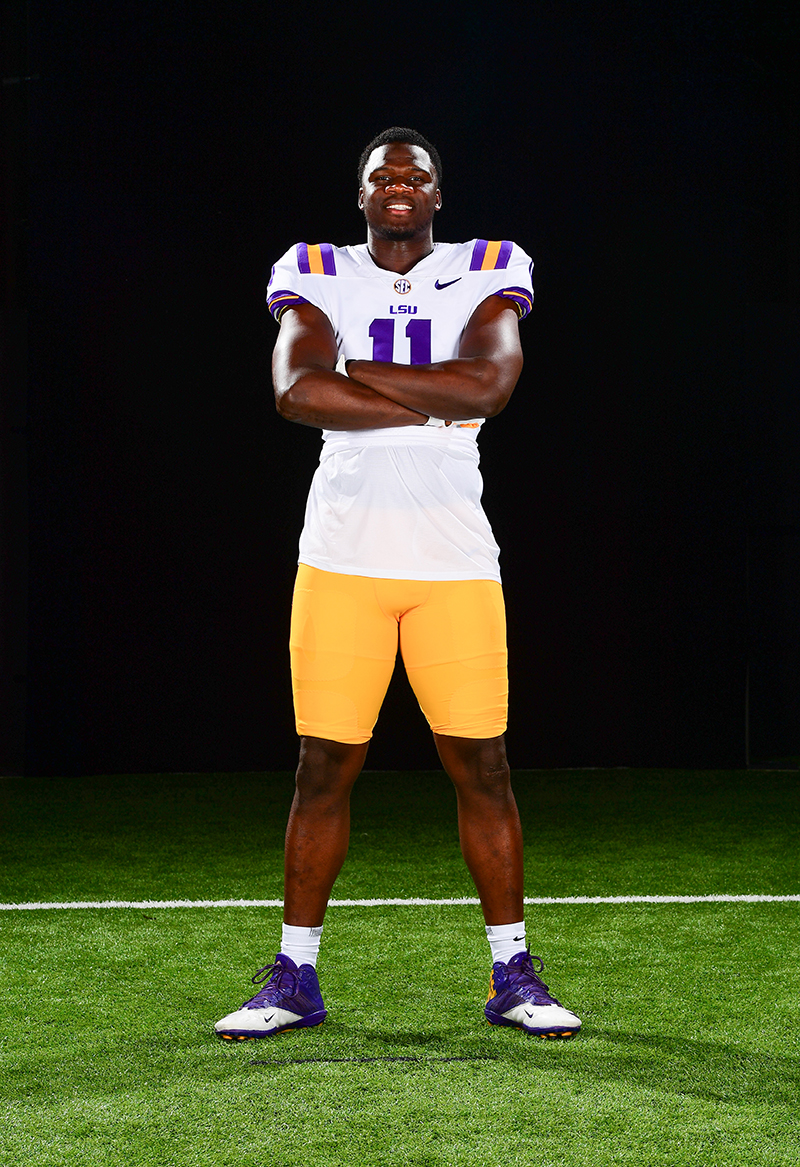
Those moments are likely few and far between now for Gaye, who has spent the past 10 years having to not only learn the game of football but also adapt to life in America.
His father, Omar, first arrived in the U.S. in 2007, but the rest of the family wouldn’t be able to follow until four years later when his mother, Afsatou Jallow, applied for asylum.
Gaye, along with his parents and two siblings, settled in Lynnwood, Washington—a small suburb right outside Seattle that had a supportive Gambian community already established.
English was Gaye’s second language, so while he was able to enroll in school and make new friends, some assignments and interactions came with an added layer of challenges.
“It was definitely the biggest change in my life,” says Gaye, who now speaks four languages in total, including his parents’ dialects of Wolof and Fulani. “I was going from my hometown, where I spoke one language and coming here and having to learn a new language. Throughout my time here I had to learn and adapt and adjust to how different everything is from what I was used to. And I’m still adjusting. Every day I learn a new thing about being here, so I’m still in that learning process even though I’ve been here for a little while.”
Gaye naturally turned to athletics as an outlet when he arrived in America, initially taking up basketball his first year in middle school.
By his eighth grade year, Gaye had begun to grow into his formidable frame and decided to join the football team. He didn’t know a ton about the game, but he was searching for new ways to stay active and involved in sports however he could.
“At the school, soccer wasn’t really a program that was there,” Gaye says. “I had to find other ways to get active and get involved in sports. It was just me putting myself out there and trying new things.”
Flash forward 10 years later, and it would turn out to be one of the best decisions Gaye ever made.
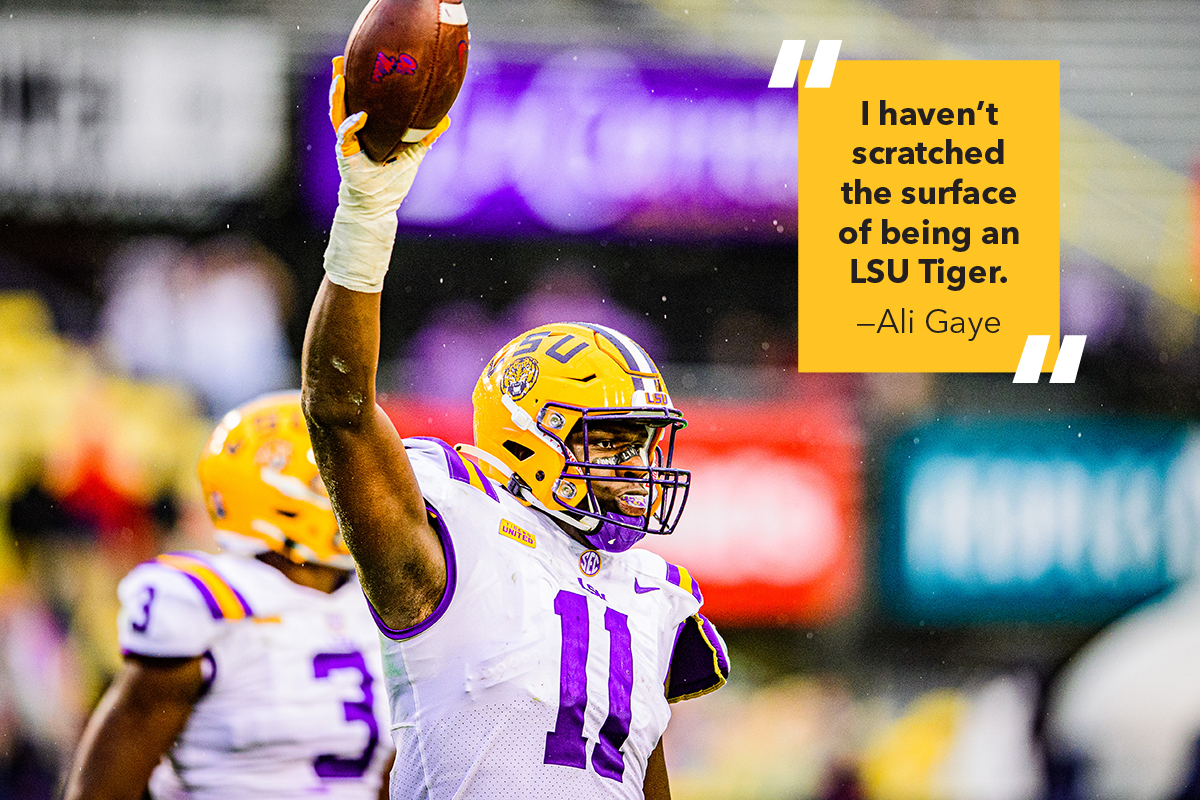
THE BUMPY ROAD TO BATON ROUGE
On paper, Gaye seemed to be picking up his newfound football fondness pretty quickly.
His soccer background gave him nimble footwork, his basketball skills helped him develop better balance and quick hands, and an early high school growth spurt saw him add half a foot and half a hundred pounds to his body.
Gaye would go on to become an All-Wesco 3A/2A South honoree three times in four seasons at Edmonds-Woodway High School, and he earned a three-star status according to most recruiting sites.
He signed on to play football at the University of Washington in 2017, but he was ruled ineligible shortly after due to an insufficient SAT score. So Gaye once again had to leave the place he called home and relocate to a new environment, this time at Arizona Western in Yuma, Arizona.
He played in 11 games that season for the Matadors and recorded eight tackles, primarily focusing on his development as a fundamentally-sound football player.
“The most important thing is you’ve got to be a student of the game,” Gaye says. “That’s something I’ve really tried to improve on being an athlete, because the more you know off the field, the more you use on the field. (I was) just learning the technique, trying to be a student of the game, and just trying to improve my mentality as much as possible towards the game.”
While Gaye continued to grow in the sport, it didn’t take long for the football gods to throw yet another twist into his already winding journey. Just four days after its 2018 season finale, Arizona Western announced it would be discontinuing its football program.
Gaye would once again be looking for a new home.
Tom Minnick, who was the Matadors’ head coach while Gaye was there, took a new job at Garden City Community College in Kansas and convinced his budding pupil to follow suit.
There, Gaye would continue to improve his game under a familiar coaching staff and wound up posting 44 tackles, 7.5 tackles for loss, one sack, one forced fumble, one pass breakup and two blocked kicks.
His performance earned him a spot on the 2019 All-Jayhawk League First Team, and 247Sports.com ranked him as the No. 2 strongside defensive end in Junior College in his class.
Gaye turned the heads of a number of big-time college football programs, including Ed Orgeron and LSU, who would ultimately win his signature.
“Ali was raw when he came here,” Orgeron said after Gaye’s first game for the Tigers, where he racked up three tackles, three pass breakups, 11 quarterback pressures and an additional nine hurries with one sack. “I think he is going to be a high pick, first-, second-, third-round pick. He’s going to play in the NFL. Hopefully he stays for two years.
“Don’t get too good,” Orgeron finished with a smirk.
Gaye didn’t listen.
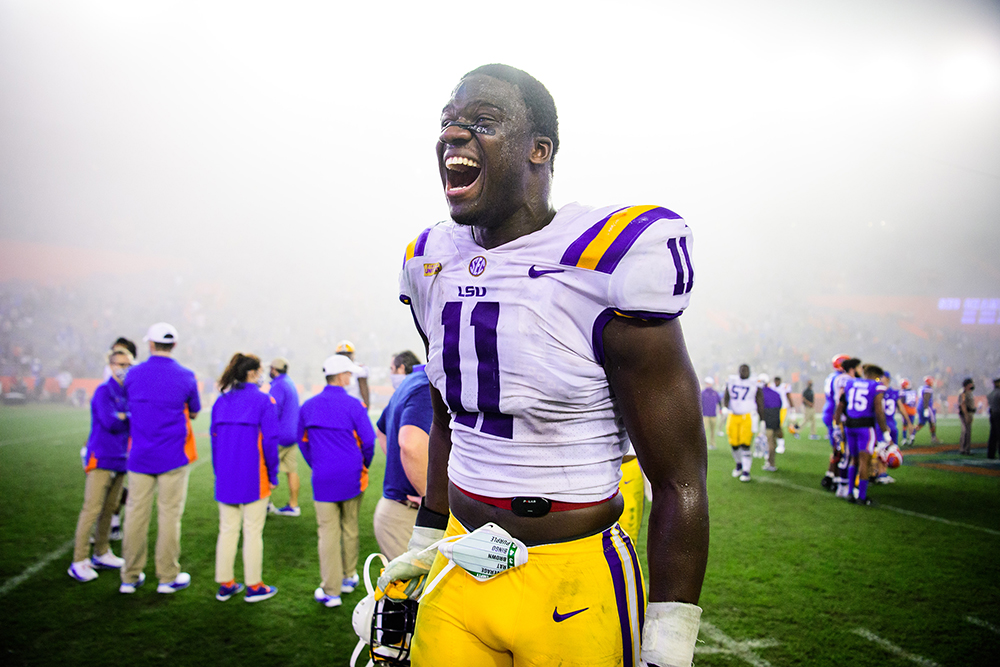
EARNING HIS STRIPES
Part of Orgeron’s wish did come true—Gaye stayed at LSU for two seasons and is now entering his third year as a Tiger, capitalizing on the additional year of eligibility granted from the COVID-19 pandemic.
And as Orgeron’s aforementioned words indicate, Gaye didn’t take long to make his mark in Baton Rouge.
He started all 10 games his first year at LSU, leading the team and ranking No. 6 in the SEC with 9.5 tackles for loss. He tallied a total of 32 tackles, two sacks, one interception, one forced fumble and one fumble recovery, while also either leading the team or being tied for the team lead with six pass breakups and five quarterback hurries.
“I always try to be an energetic player,” says Gaye, who would go on to earn second-team All-SEC honors for his showing in 2020. “My mentality and the way I perceive the game (has changed) ever since I came here. Another thing that’s improved is my technique and really being under coaches who know the game, who have studied the game and who are knowledgeable about the game.”
Those improvements were on full display early in 2021 as well, where Gaye started the season with 19 tackles, 2.5 tackles for loss and 2.5 sacks while battling injury and playing in four of the first six games of the year.
He would eventually be ruled out for the remainder of the season after re-aggravating an upper body injury against Kentucky—yet another hurdle attempting to stand in Gaye’s way.
Despite some decent NFL draft outlooks, Gaye announced in January that he would return to LSU for one final run in the purple and gold.
Along with the benefits an additional year of college will bring to both himself and LSU, Gaye’s decision to stay feels like a poetic ending to his amateur career.
He had to leave Africa to seek asylum in Washington.
He had to leave Washington to move to Arizona to begin his college football career.
He had to leave Arizona for Kansas when his school shuttered its football program.
And he had to leave Kansas to take a chance on Baton Rouge, Louisiana—4,916 miles from where his journey started.
“This is home,” Gaye says. “Leaving would have been too soon. I felt like it was more meaningful for me to stay. Spending an extra year with these guys and the coaches in Baton Rouge, it’s been a humbling experience for me. I’ve been here for two years and I’ve been welcomed with open arms. So I didn’t want to leave early, because I haven’t scratched the surface of being an LSU Tiger.”
This article was originally published in the August 2022 Tiger Pride issue of 225 magazine.
|
|
|
